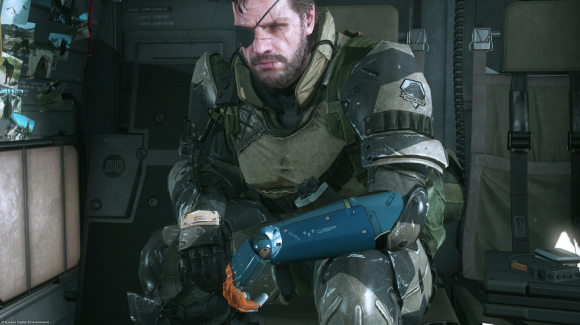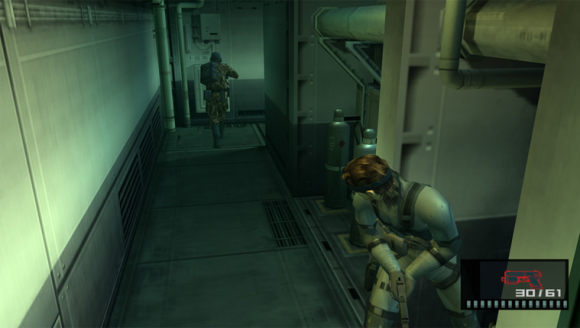
Famed Metal Gear director calls Japanese creators “strange” for spending so much time and money on their finales.
Now that he’s left video game publisher Konami and become his own boss, Metal Gear director Hideo Kojima is enjoying his new freedom in being as outspoken as he wants to be with his opinions. As one of the most globally respected Japanese game designers, Kojima has shown plenty of enthusiasm for teaming up with with overseas creators, but his own sensibilities may not be completely internationalized, judging from comments he recently made.
In an interview with Japanese website Comic Natalie, Kojima spoke about some of the differences between the Japanese and Western video game markets, as well as the gamers that play in them, and had this bold statement to make:
“Overseas, they say the last scene is the least necessary part of the game.”
Kojima can see some logic behind the sentiment, as obviously any number of people will purchase and start playing the game, yet quit before reaching the end. What’s more, he says that foreign game creators understand and accept this fact, and thus choose to pour their efforts and resources into the opening stages of a game, which they can be sure of every player experiencing. As a result, the game’s ending is more of an afterthought, and Kojima expresses his belief that foreign titles will often have their endings severely truncated if the budget or schedule is too tight for the creator’s original vision.
Taking this into consideration, Kojima muses that “It’s strange that Japanese creators put so much money into their final scenes.”
He even goes so far as to say that foreign gamers aren’t bothered by this phenomena. That theory fits with the greater preference foreign gamers have shown (compared to their Japanese counterparts) for open-world titles and complete character customization, which allows them to imagine themselves as independent individuals within the game’s setting and thus reduces the satisfaction that comes from a scripted ending sequence.
Kojima does point out one exception to foreign gamers’ blasé attitudes regarding video game conclusions, though: His own titles. “When I don’t make a great ending, people get mad at me,” he notes, lamenting the difficulties in making a game that’s so strongly connected with a single creator and his personal style.
Long-time gamers may find a lot of irony within Kojima’s words. His most recent title, Metal Gear Solid V, received widespread praise for its scale, gameplay, and visuals, but also drew complaints for what many felt was a lackluster narrative and disappointing ending. What’s more, many would argue that the first third of Metal Gear Solid 2, another Kojima game, was vastly superior in terms of polish and fun than the several hours that came after, including the ending. As a matter of fact, players could unlock the option to replay the opening segment all by itself and skip the rest of the game.
Still, as someone who’s not typically known for turning in half-efforts, Kojima sounds at least a little facetious when he calls Japanese directors “strange” for wanting to craft impressive endings, especially when he goes on to talk about his distaste for trying too hard to give gamers instant gratification. Instead, he asserts that there’s a unique enjoyment to be felt when the creator surprises players with something different from what they were asking for. In light of his abrupt departure from Konami after decades with the company, it’s hard not to take some of Kojima’s words as thinly veiled potshots at his former employers who perhaps told him to hurry up and release Metal Gear V already instead of tinkering around with its ending visuals and script.
But of course, now that he’s got his own studio, Kojima can wrap up his games however he wants.
Source: Comic Natalie via Jin
Top image: Konami
Insert images: Konami


 Hideo Kojima officially leaves Konami, opens own studio, announces new PlayStation 4 game 【Video】
Hideo Kojima officially leaves Konami, opens own studio, announces new PlayStation 4 game 【Video】 Metal Gear fans’ worst fear comes true as proud video game masterpiece becomes a pachinko machine
Metal Gear fans’ worst fear comes true as proud video game masterpiece becomes a pachinko machine Ever wanted to work with legendary video game creator Hideo Kojima? Kojima Productions now hiring
Ever wanted to work with legendary video game creator Hideo Kojima? Kojima Productions now hiring Geoff Keighley: Konami bans Metal Gear Solid V’s Hideo Kojima from game awards
Geoff Keighley: Konami bans Metal Gear Solid V’s Hideo Kojima from game awards Trailer for Metal Gear Survive looks like the death of the video game franchise as we know it
Trailer for Metal Gear Survive looks like the death of the video game franchise as we know it Survey finds that one in five high schoolers don’t know who music legend Masaharu Fukuyama is
Survey finds that one in five high schoolers don’t know who music legend Masaharu Fukuyama is Highest Starbucks in Japan set to open this spring in the Tokyo sky
Highest Starbucks in Japan set to open this spring in the Tokyo sky Saitama is home to the best strawberries in Japan that you’ve probably never even heard of
Saitama is home to the best strawberries in Japan that you’ve probably never even heard of Osaka establishes first designated smoking area in Dotonbori canal district to fight “overtourism”
Osaka establishes first designated smoking area in Dotonbori canal district to fight “overtourism” Development of Puyo Puyo puzzle game for use in nursing homes underway
Development of Puyo Puyo puzzle game for use in nursing homes underway Women at World Wushu Championships attack each other at the speed of light
Women at World Wushu Championships attack each other at the speed of light Samurai chick pudding cake is Japan’s newest hard-to-buy, delicious-to-eat treat【Taste test】
Samurai chick pudding cake is Japan’s newest hard-to-buy, delicious-to-eat treat【Taste test】 Japanese tough guy fashion starter pack: Testing the Birth Japan lucky bag【Photos】
Japanese tough guy fashion starter pack: Testing the Birth Japan lucky bag【Photos】 Horse meat sushi restaurant opens up in Tokyo, becomes sushi’s latest craze 【Photos】
Horse meat sushi restaurant opens up in Tokyo, becomes sushi’s latest craze 【Photos】 Foreign tourists in Japan will get free Shinkansen tickets to promote regional tourism
Foreign tourists in Japan will get free Shinkansen tickets to promote regional tourism The 10 most annoying things foreign tourists do on Japanese trains, according to locals
The 10 most annoying things foreign tourists do on Japanese trains, according to locals Starbucks Japan releases new sakura goods and drinkware for cherry blossom season 2026
Starbucks Japan releases new sakura goods and drinkware for cherry blossom season 2026 Naruto and Converse team up for new line of shinobi sneakers[Photos]
Naruto and Converse team up for new line of shinobi sneakers[Photos] Is Sapporio’s Snow Festival awesome enough to be worth visiting even if you hate the snow? [Pics]
Is Sapporio’s Snow Festival awesome enough to be worth visiting even if you hate the snow? [Pics] Japan has trams that say “sorry” while they ride around town…but why?
Japan has trams that say “sorry” while they ride around town…but why? Tokyo Skytree turns pink for the cherry blossom season
Tokyo Skytree turns pink for the cherry blossom season Sakura Totoro is here to get spring started early with adorable pouches and plushies
Sakura Totoro is here to get spring started early with adorable pouches and plushies Poop is in full bloom at the Unko Museums for cherry blossom season
Poop is in full bloom at the Unko Museums for cherry blossom season Shibuya Station’s Hachiko Gate and Yamanote Line stairway locations change next month
Shibuya Station’s Hachiko Gate and Yamanote Line stairway locations change next month Japan’s new “Cunte” contact lenses aren’t pronounced like you’re probably thinking they are
Japan’s new “Cunte” contact lenses aren’t pronounced like you’re probably thinking they are Japan’s newest Shinkansen has no seats…or passengers [Video]
Japan’s newest Shinkansen has no seats…or passengers [Video] Foreigners accounting for over 80 percent of off-course skiers needing rescue in Japan’s Hokkaido
Foreigners accounting for over 80 percent of off-course skiers needing rescue in Japan’s Hokkaido Super-salty pizza sends six kids to the hospital in Japan, linguistics blamed
Super-salty pizza sends six kids to the hospital in Japan, linguistics blamed Starbucks Japan unveils new sakura Frappuccino for cherry blossom season 2026
Starbucks Japan unveils new sakura Frappuccino for cherry blossom season 2026 Take a trip to Japan’s Dododo Land, the most irritating place on Earth
Take a trip to Japan’s Dododo Land, the most irritating place on Earth Is China’s don’t-go-to-Japan warning affecting the lines at a popular Tokyo gyukatsu restaurant?
Is China’s don’t-go-to-Japan warning affecting the lines at a popular Tokyo gyukatsu restaurant? Survey asks foreign tourists what bothered them in Japan, more than half gave same answer
Survey asks foreign tourists what bothered them in Japan, more than half gave same answer Japan’s human washing machines will go on sale to general public, demos to be held in Tokyo
Japan’s human washing machines will go on sale to general public, demos to be held in Tokyo Starbucks Japan releases new drinkware and goods for Valentine’s Day
Starbucks Japan releases new drinkware and goods for Valentine’s Day We deeply regret going into this tunnel on our walk in the mountains of Japan
We deeply regret going into this tunnel on our walk in the mountains of Japan Studio Ghibli releases Kodama forest spirits from Princess Mononoke to light up your home
Studio Ghibli releases Kodama forest spirits from Princess Mononoke to light up your home Major Japanese hotel chain says reservations via overseas booking sites may not be valid
Major Japanese hotel chain says reservations via overseas booking sites may not be valid Put sesame oil in your coffee? Japanese maker says it’s the best way to start your day【Taste test】
Put sesame oil in your coffee? Japanese maker says it’s the best way to start your day【Taste test】 No more using real katana for tourism activities, Japan’s National Police Agency says
No more using real katana for tourism activities, Japan’s National Police Agency says GameSpot: Hideo Kojima wants new game to expand into anime
GameSpot: Hideo Kojima wants new game to expand into anime Konami denies report of Hideo Kojima leaving company
Konami denies report of Hideo Kojima leaving company P.T. easter egg discovered tucked away in Metal Gear Solid V 【Video】
P.T. easter egg discovered tucked away in Metal Gear Solid V 【Video】 Video game legend Hideo Kojima’s new YouTube channel launches 【Updated】
Video game legend Hideo Kojima’s new YouTube channel launches 【Updated】 Metal Gear Solid composer talks Konami fall out
Metal Gear Solid composer talks Konami fall out Hideo Kojima’s company closes office after employee confirmed infected with coronavirus
Hideo Kojima’s company closes office after employee confirmed infected with coronavirus Hideo Kojima to be inducted into Academy of Interactive Arts & Sciences Hall of Fame
Hideo Kojima to be inducted into Academy of Interactive Arts & Sciences Hall of Fame Hideo Kojima thinks there’s a better way to spend your coronavirus free time than playing games
Hideo Kojima thinks there’s a better way to spend your coronavirus free time than playing games Is Metal Gear Solid V finally getting a release date? Mysterious countdown appears on website
Is Metal Gear Solid V finally getting a release date? Mysterious countdown appears on website Hideo Kojima, Guillermo del Toro to Host Joint Presentation at D.I.C.E. Summit
Hideo Kojima, Guillermo del Toro to Host Joint Presentation at D.I.C.E. Summit Hideo Kojima’s Silent Hills might just be the horror game we’ve been waiting for【Videos】
Hideo Kojima’s Silent Hills might just be the horror game we’ve been waiting for【Videos】 Trailer for Death Stranding – Kojima’s first game after Konami – is here and it’s amazing【Video】
Trailer for Death Stranding – Kojima’s first game after Konami – is here and it’s amazing【Video】 Japanese special edition Metal Gear Solid V buyers get a Diamond Dogs jacket
Japanese special edition Metal Gear Solid V buyers get a Diamond Dogs jacket Conan O’Brien asks Hideo Kojima for a job, sings Live Band Karaoke, and says sayonara to Japan
Conan O’Brien asks Hideo Kojima for a job, sings Live Band Karaoke, and says sayonara to Japan